Jeremy Corbyn: We can climb electoral mountain
- Published
- comments
Jeremy Corbyn: "Investment and assistance, not racism and division"
Jeremy Corbyn says he is convinced his party can climb an "electoral mountain" to general election success.
Closing his party's conference in Liverpool, the Labour leader said it could build support by focusing on the "needs and aspirations of middle and lower income voters".
He also promised no "false promises" on immigration numbers, focusing instead on a new fund for high-migration areas.
And he urged colleagues to "end the trench warfare" and take on the Tories.
In his second conference speech as party leader, Mr Corbyn - who was re-elected on Saturday by an increased margin - urged supporters to prepare for an early general election.
"Let's do it, and be ready for the challenge whenever it comes," he said.
Recent months had been a "testing time" for his party, including the death of Jo Cox, the European referendum and divisions over the leadership contest "spilling over", he said.
Mr Corbyn ended his hour-long speech by promising to "build a fairer Britain in a peaceful world".
He also:
Promised to lift borrowing restrictions on councils to allow them to fund more housebuilding
Promised a £160m "arts pupil premium" to offer children access to music, drama and dance
Described anti-Semitism as an "evil", adding: "Every one of us has a responsibility to ensure that it is never allowed to fester in our society again"
Said the "so-called free market system" had "produced grotesque inequality"
Received a standing ovation for saying Labour would repeal the Trade Union Act
Said Theresa May could not "walk the walk" on inequality, saying the Tories were "funded by the privileged few, for the benefit of the privileged few"
Offered a "new deal" to businesses - investment in infrastructure in return for tax increases
Promised to suspend UK arms sales
Accused the government of "bringing division back" with plans to expand grammar schools
Supporters chanted "Jez we can" as the leader took to the stage with a joke about his recent trouble finding a seat on board a Virgin train.
To cheers from the conference floor, Mr Corbyn paid tribute to MPs who he promoted to the shadow cabinet after mass front-bench resignations in the aftermath of the EU referendum.
"They stepped up when their party and in fact their country needed them to serve," he said.
Jeremy Corbyn told BBC Radio 4's Today people should recognise the "huge contribution" of migrants
He said his party had a responsibility to act like a government-in-waiting, especially given what he said was the growing prospect of Prime Minister Theresa May calling a snap election next year.
"It's true there's an electoral mountain to climb," he said.
"But if we focus everything on the needs and aspirations of middle and lower income voters, of ordinary families, if we demonstrate we've got a viable alternative to the government's failed economic policies, I'm convinced we can build the electoral support that can beat the Tories."
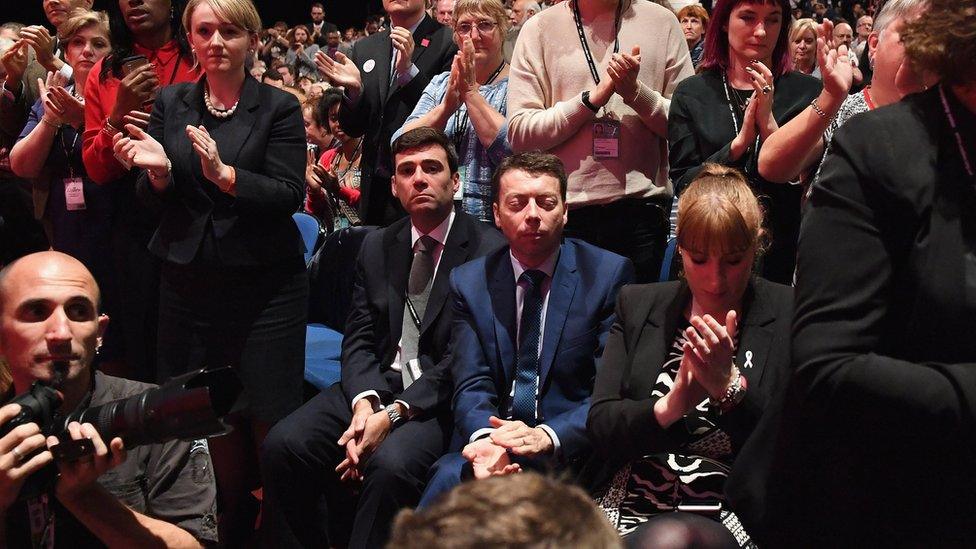
The leader said his shadow cabinet had "stepped up" after their predecessors resigned
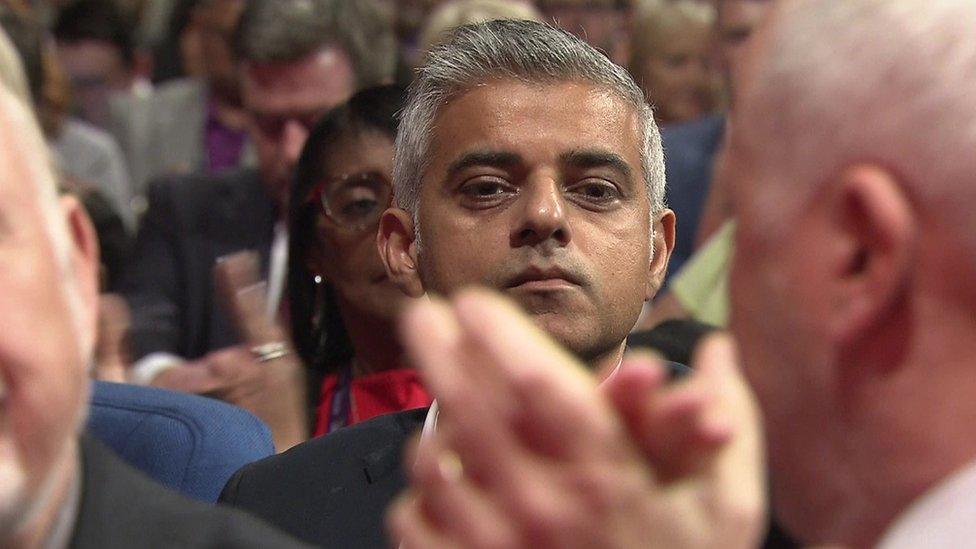
Mr Corbyn paid tribute to Labour's electoral successes including London Mayor Sadiq Khan
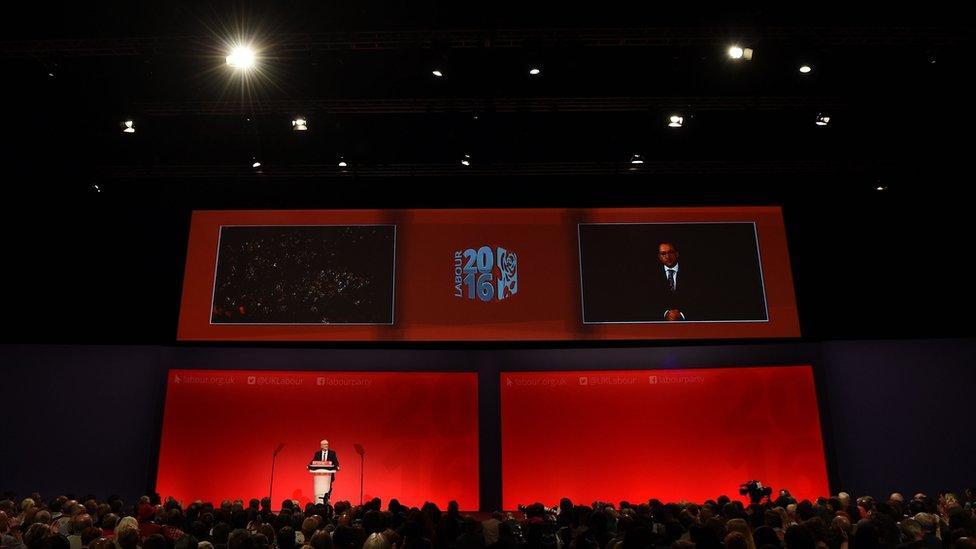
This was Jeremy Corbyn's second party conference speech as Labour leader
Some Labour MPs have called for the party to back reforms to curb immigration, following the vote to leave the European Union.
And earlier on Wednesday, shadow home secretary Andy Burnham criticised an "out of touch elite" for not listening to voters' concerns about "unlimited, unfunded, unskilled migration".
But Mr Corbyn said Labour would not "sow division" with "false promises" in relation to Brexit, but "instead tackle the real issues of immigration and make the real changes that are needed".
He said he was committed, if he becomes prime minister, to measures to help relieve some of the pressures on "hard-pressed public services" such as health, housing and education exacerbated by migrant inflows.

Analysis by Laura Kuenssberg, BBC political editor
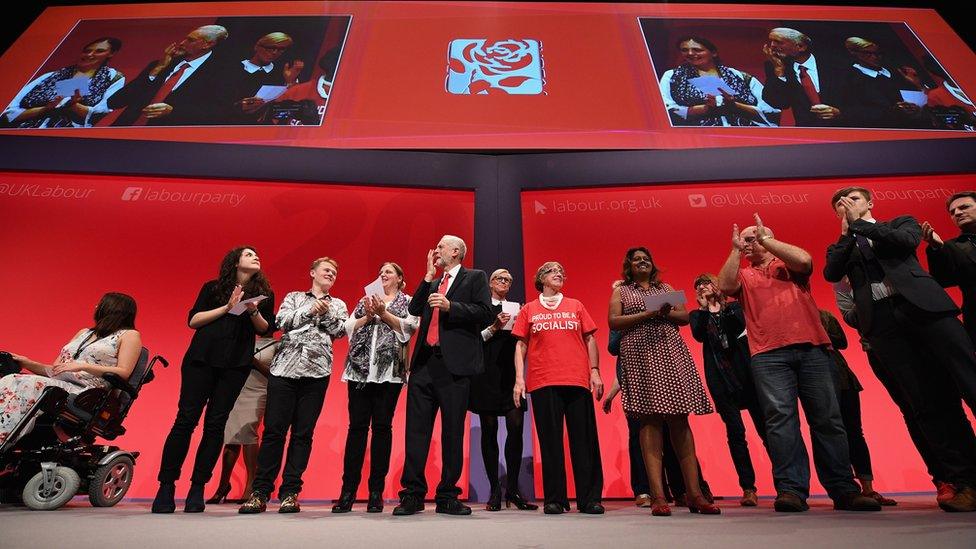
After five days of talking to delegates in Liverpool, it is astonishing how different their impressions of their leader are.
Backers of Jeremy Corbyn look at his huge success with the party membership, and see his second victory as another major step towards building a movement that can get to Number 10 - a win that allows him a chance to reassert his authority over Labour and for supporters to be given more power.
This afternoon, they looked at him on the platform as a leader who has changed the Labour Party, and now is on his way to changing the country.
But his critics - still the majority of MPs and also many long-standing members of the party - look at Mr Corbyn, some in anger, some in sorrow. They see a man on the platform whose long standing principles are alien to most voters in the middle, where elections have been traditionally won.

In 2010, the coalition government scrapped the Migrant Impact Fund set up a year earlier by its Labour predecessor.
Mr Corbyn said Labour would reinstate the fund, with levels of funding to be linked to local authorities' needs, to be paid for in part from money raised from visa applications to enter the UK and a new levy on citizenship application fees.
"We will act to end the exploitation of migrant labour to undercut workers pay and conditions," he added.
"And we will ease the pressure on hard-pressed public services - services that are struggling to absorb Tory austerity cuts, in communities absorbing new populations."
Jeremy Corbyn conference speech in full
In a message to businesses, Mr Corbyn promised to "rebuild Britain's infrastructure".
"But investment in capital must include investment in human capital, the skilled workers needed to make our economy a success," he said.
"So this is the deal Labour will offer to business.
"To help pay for a National Education Service, we will ask you pay a little more in tax."
In full: Jeremy Corbyn's BBC interview with Laura Kuenssberg
He also promised "good businesses" Labour would clamp down on those that "dodge their taxes".
The British Chambers of Commerce said many companies would be concerned the Labour leader was "reaching for the tax lever by asking businesses to pay for his education plans".
'Divisive talk'
Mr Corbyn's plea for unity in the Labour Party was echoed earlier by Mr Burnham, who also confirmed he was leaving the shadow cabinet in order to contest the Greater Manchester mayoral election.
A Labour government of any kind, he said, is "a million time times better" for his constituency than the Conservatives - "and that is more likely to happen if Labour is united".
"So let us unite - let's have an end to divisive talk about deselections but, in return, let's have more respect for the democratic will of you, our members," he said.
Responding to Mr Corbyn's comments on immigration, Home Secretary Amber Rudd said: "All this shows is that Jeremy Corbyn wants unlimited immigration - and presides over a Labour Party that is too divided, incompetent and distracted to lead our country."
UKIP said Labour offered nothing for "millions of decent patriotic Labour supporters who voted Leave and want to see levels of migration brought down", while Lib Dem leader Tim Farron said Mr Corbyn had "barely mentioned Brexit".
- Published27 September 2016
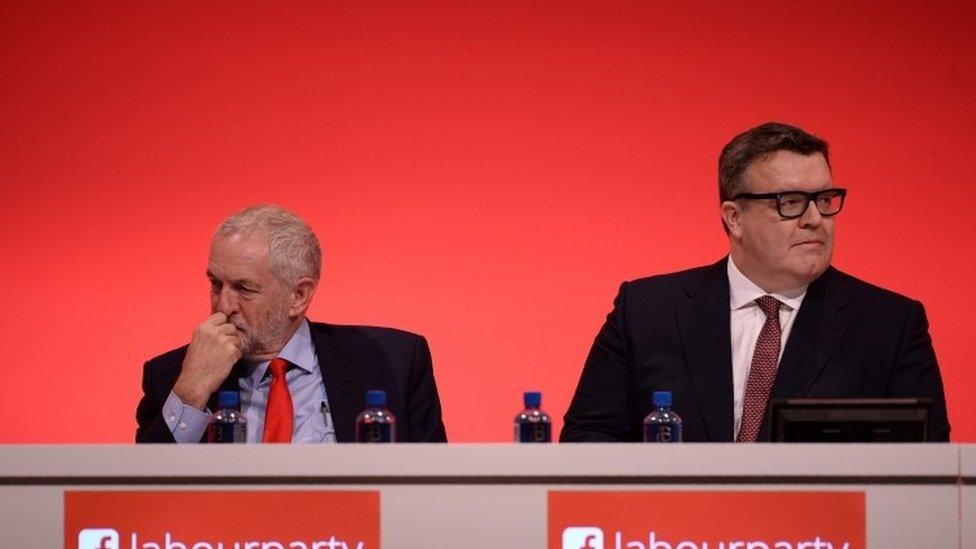
- Published27 September 2016
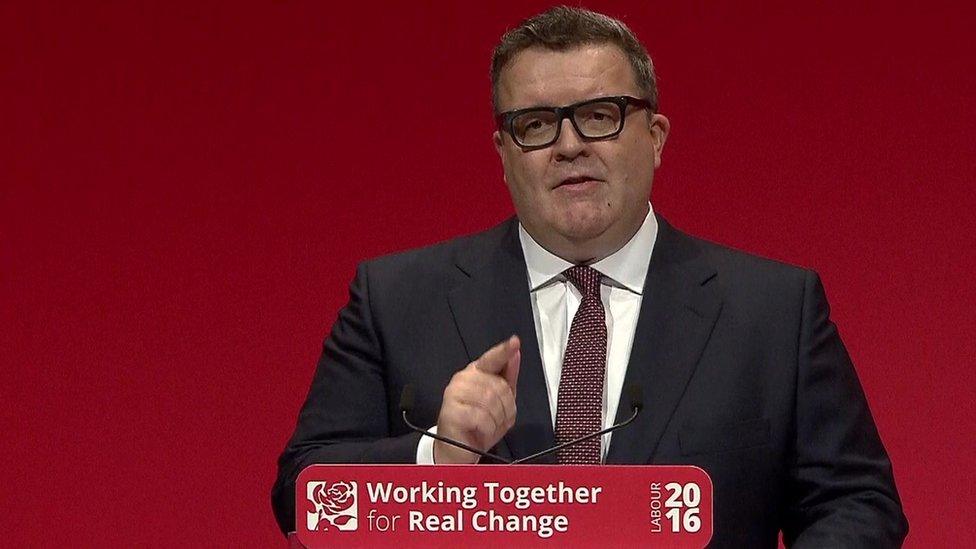
- Published27 September 2016